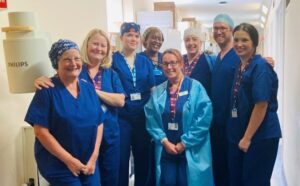14 May 2023
What is ODP Day?

Operating Department Practitioner (ODP) day is a day to celebrate the work of the operating department practitioner profession. It is also a day for colleagues and the public to find out more about the ODP role.
What is an Operating Department Practitioner?
Operating Department Practitioners (ODPs) are highly skilled members of the surgical team, working alongside surgeons, anaesthetists, theatre nurses and other healthcare professionals to help ensure that every surgical procedure is as safe and effective as possible.
The role of an ODP is varied, no two days are the same. The role covers three core areas: Anaesthetics, surgical and recovery, which sees the ODPs involved in every stage of the patient’s theatre journey. From the anaesthetic, whereby the patient is put to sleep, to surgical assistance and the care of the patients immediately after surgery in the recovery suit.
A day in the life of an ODP
A typical day in the life of an ODP is a varied one. First, the whole team will ‘huddle’ to receive updates from around the hospital and the wider healthcare community. The theatre team will then perform safety checks on all the equipment to ensure everything is in working order so they can get their theatres set-up for the surgeries that day. Prior to operating, the whole multidisciplinary team will have a team brief.
This is when they discuss every patient individually and find out their specific requirements. At this stage, if the schedule needs to be changed to a suit patients’ specific requirements, it will be done. Once the patient has had their surgery they will be taken to recovery. This is quite a diverse area for the ODP to work in, many skills are required in this department from airway management to pain relief, post anaesthesia care is often most difficult as the patients have less awareness and compliance due to the anaesthesia they have received. As a recovery practitioner you must have the ability and competence to safely discharge the recovering patient back to a ward or for the more complicated patient perhaps to high dependency or intensive care unit.
How do I become an ODP?
You’ll need to complete a BSc (Hons) in Operating Department Practice. Once graduated, you’ll able to enter an exciting and rewarding career in healthcare. Having the knowledge and skills to provide care in the perioperative environment as well as expanding areas such as Intensive Care, Interventional radiology or A&E provides you the opportunity to follow your own career path.
After graduating you will need to apply for registration with the Health and Care Professions Council so that you can be accepted onto the national register as an Operating Department Practitioner. This entitles you to practice as a registered practitioner and is mandatory for NHS employment.
Find out more about becoming a qualified ODP